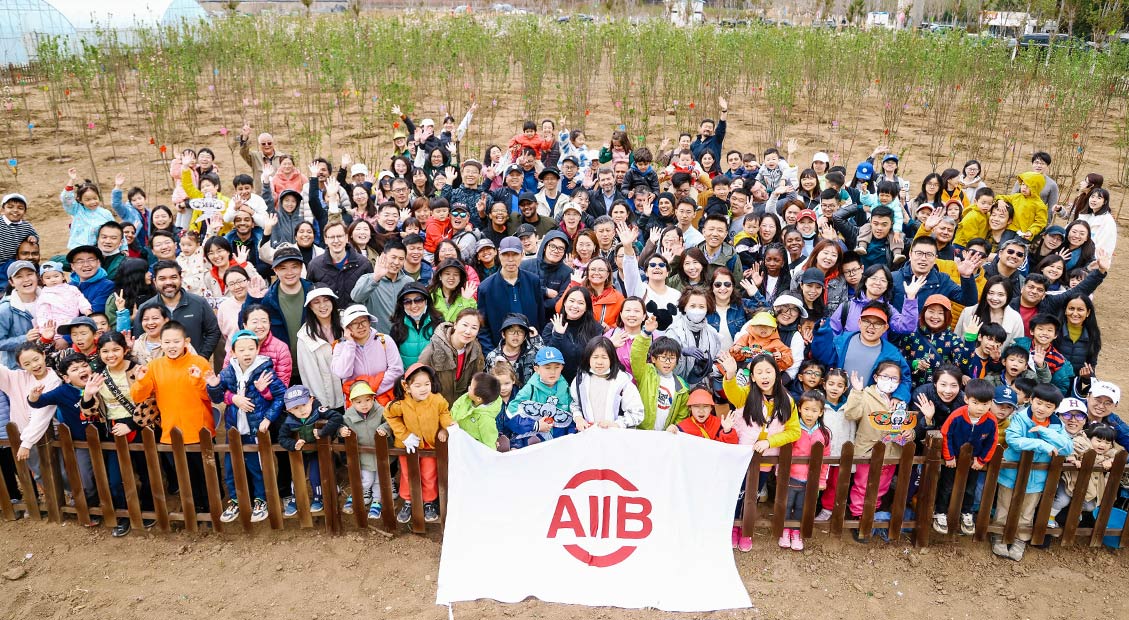Part of the Asian Infrastructure Investment Bank’s commitment to sustainable economic development is contributing to local sustainability. Thus, in addition to our commitments in our Corporate Strategy to increase our climate financing to at least 50% by 2025, and full alignment of our new financing operations with the Paris Agreement by July 1, 2023, we are also taking major steps to reduce our own carbon footprint. We are targeting to achieve carbon neutrality in our internal operations and align our internal activities with the Paris Agreement by 2025.
We recently released our first AIIB Carbon Footprint Report, which provides a comprehensive analysis of the carbon footprint generated by our internal operations at our permanent Headquarters in Beijing, and documents how we are promoting low carbon emissions in our institutional activities and facilities. To help with the goal of controlling global warming by 1.5°C in line with the Paris Agreement, we aim to lead by example by managing our own carbon emissions.
In 2020, we launched an initiative aimed at capturing greenhouse gases (GHGs) from our internal operational activities and converting them to carbon dioxide, following guidelines set by the Intergovernmental Panel on Climate Change. By 2022, we also began following the ISO 14064-1: 2018 specification and guidance for verifying and reporting GHG emissions and removals at the organizational level, as part of our efforts to establish our carbon footprint.
We have started to implement our first Institutional Carbon Emission Management Plan (ICEM Plan) in January 2022. The Plan presents a five-year overview of AIIB's institutional greenhouse gas management strategy (2021-2025). In addition, it identifies steps for the Bank to monitor, verify, and report its institutional carbon footprint, as well as the high-level strategies the Bank might employ to cut and decarbonize institutional energy use.
Part of these efforts include ongoing efforts to reduce GHG emissions from our building and facilities, including the use of fire-suppression, refrigeration, and air conditioning systems that comply with the Montreal Protocol. We have an integrated program for operating and maintaining our Headquarters and seek to meet LEED specifications for resource conservation. We were able to achieve LEED EBOM (Existing Building Operation & Maintenance) Platinum certification in 2022. Indirect sources of GHG emissions, such as electricity and water, saw a decline between 2020 and 2023 after we moved to our permanent Headquarters.
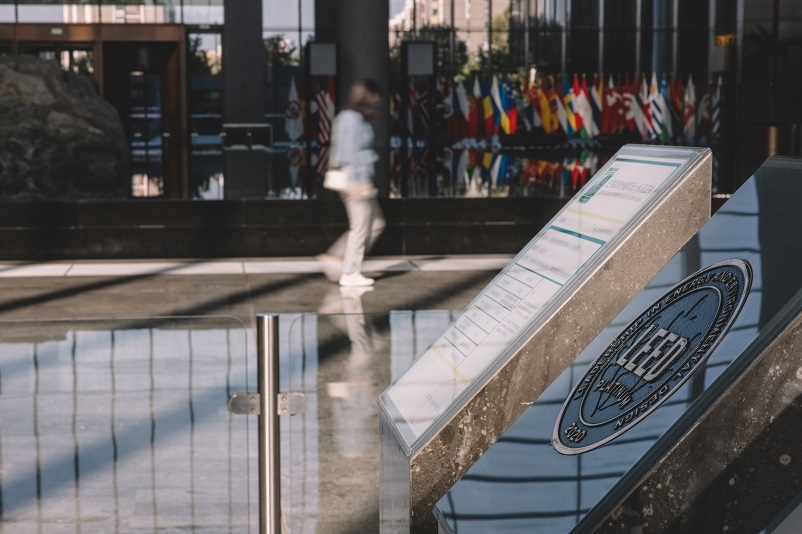
AIIB encourages the use of videoconferencing and combining several business missions into one trip to reduce business travel, which contributes to GHG emissions generated outside of the headquarters. To promote low-carbon commuting, the Bank provides bike racks and changing facilities to encourage staff to bike to work. Additionally, the Bank has implemented various measures to reduce office waste, such as by eliminating much of one-use and disposable packaging. Waste generation saw a decline between 2020 and 2023 as well.
AIIB’s information management policies resulted in initiatives to reduce our carbon footprint, such as digitizing collections to reduce the need for paper as well as physical storage space. We prioritize record-keeping in electronic formats, as well as digital publications for both our own knowledge products and our library resources.
To promote staff and public engagement, AIIB has launched various sustainable-related events, including Earth Hour, Earth Day, and Biodiversity Day.
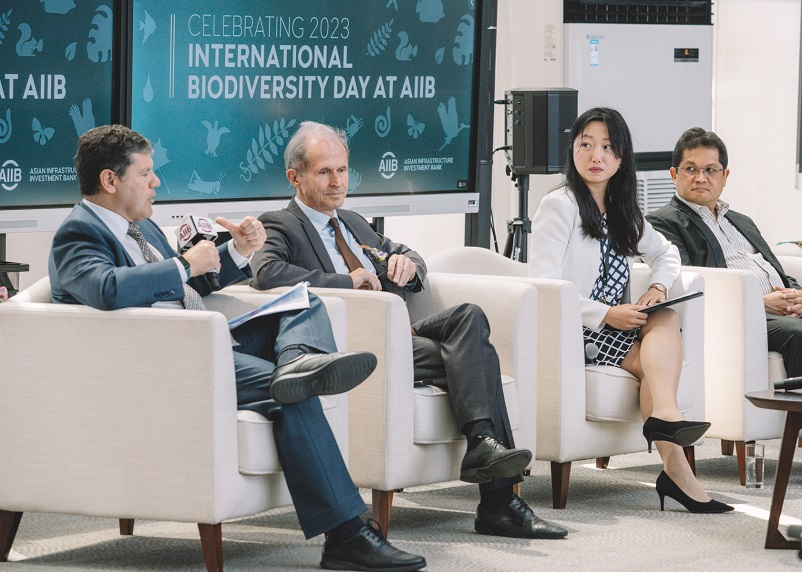
We have been supporting the Earth Hour campaign since 2016, switching off all lights in our Headquarters and encouraging staff to switch off lights at home every year from 8:30 pm to 9:30 pm on the last Saturday of March to recognize and acknowledge the array of challenges our world faces in terms of energy, climate, and poverty.
Every spring, we organize a tree-planting activity for our staff; since 2018, AIIB Bank personnel and their families have planted 1,750 trees. In April 2023, a third-party organization verified that the planted trees could absorb around 534kg of CO2 during their lifetime.
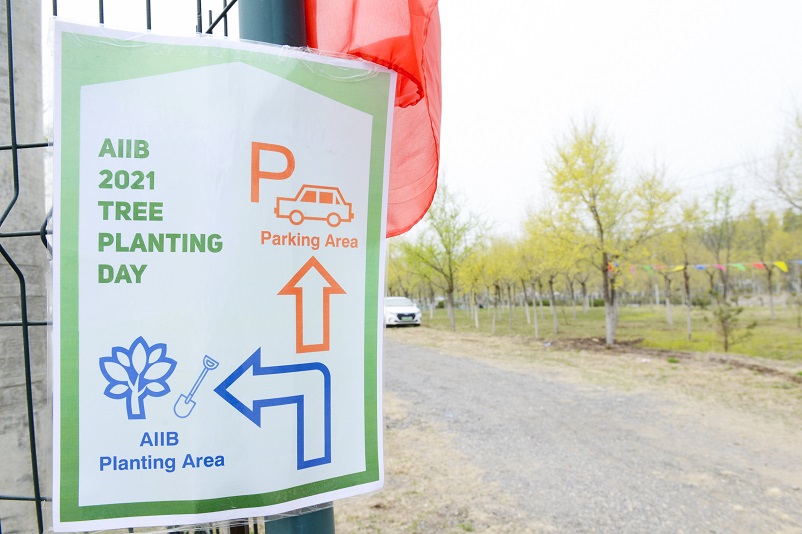
We also collaborated with the Beijing government on the Nocturnal Bird Migration project, to monitor nocturnal bird migration over our Headquarters. Beijing is along the East Asian-Australasian Flyway for millions of birds flying to and from their breeding grounds, and the project can help protect biodiversity by raising awareness about these birds and the miracle of bird migration.
We have achieved much since 2019, when we first tested carbon offsetting to deliver our first carbon-neutral Annual Meeting in Luxembourg by prioritizing free public transport and using digital documents.
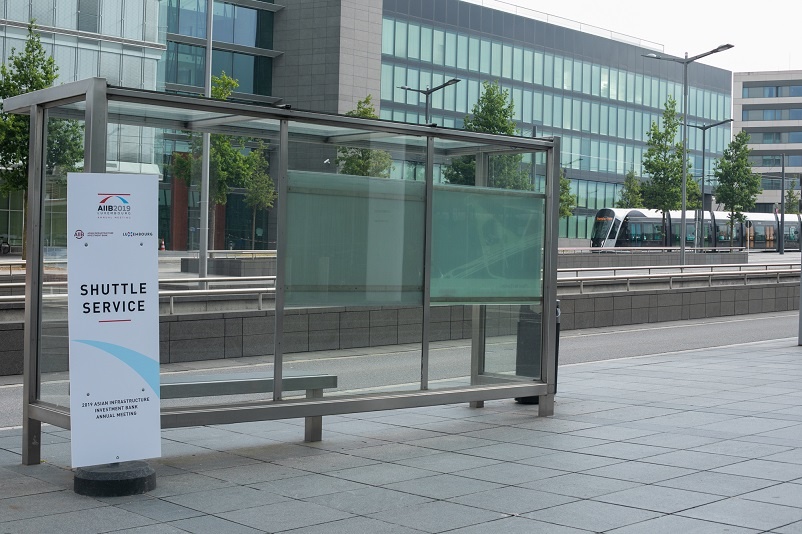
Although our efforts may seem small in terms of global GHG emissions, small actions can make a big difference. Our efforts align with the Bank's strategic priority to address climate change and demonstrate its commitment to taking tangible actions to back up its words. Our efforts also underscore the benefits and necessity of collective efforts by all stakeholders to address climate threats. We will continue to look out for all possible opportunities to reduce operational emissions and promote sustainable development.

